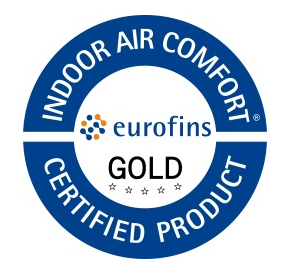Polyflor’s answers to six common environmental questions and misconceptions.
Q: Do Polyflor vinyl floors contain Phthalates?
Softening of vinyl is important in making it the flexible and versatile product that it is. Plasticisers can be added to soften vinyl flooring and phthalates are a form of plasticiser. However, the majority of Polyflor products use non-phthalate alternatives as softeners, including bio-based plasticisers. Those products that do contain phthalates only contain ortho-phthalates which are not a concern to human health.
Harmful phthalates do exist and can be found on the REACh list of banned substances. Polyflor does not use these phthalates or any other substances which are harmful to human health and feature on the REACh list.
Q: Does Polyflor vinyl emit VOC emissions?
All Polyflor flooring ranges have passed key international environmental and safety standards and we continuously look to reformulate our ranges to ensure their VOC emissions are kept to the lowest levels achievable. Polyflor ranges have undergone many independent and rigorous VOC tests and have approval certification for the following: AgBB; Swedish B.P.D (FLEC test); Finland M1 test; GBCA Compliant (Global GreenTagCertTM approval); Afsset A+ and FloorScore®. The most recent test method by Eurofins, is ‘Indoor Air Comfort’. This test method is the most comprehensive and stringent within the industry, worldwide, and tests for all known emissions. Polyflor products tested to date have achieved Indoor Air Comfort Gold.
Understanding the Indoor Air Comfort Gold rating
 Eurofins "Indoor Air Comfort" (IAC) product certification is an innovative tool to show compliance of a product with low VOC emissions criteria set out in Europe on two levels:
Eurofins "Indoor Air Comfort" (IAC) product certification is an innovative tool to show compliance of a product with low VOC emissions criteria set out in Europe on two levels:
Standard level "Indoor Air Comfort - certified product" shows compliance of product emissions with the criteria of all legal specifications issued by authorities in the European Union and its Member States.
Higher level "Indoor Air Comfort GOLD - certified product" shows additional compliance of product emissions with the criteria of many of the voluntary specifications issued by most relevant ecolabels and similar specifications in the EU. Therefore, certified products are those with the best-in-class low emissions, thus good for indoor air quality.
Q: Does Polyflor vinyl emit Dioxins during production and incineration?
Dioxins are toxic chemicals which occur as an unwanted by-product of some chemical reactions within manufacture (of any product using heating or thermal processing) and during incineration. Modern day clean PVC is not a significant contributor of dioxin emissions. The annual dioxin concentration of the entire UK PVC industry is less than 140mg per annum, whereas a single tug boat in the North Sea is 70mg per annum.
Power stations and the steel industry are the biggest man-made producers of dioxin emissions whilst the biggest known sources of dioxin emission are the burning of wood and bio-fuels. Moreover, dioxins occur naturally in the environment, for instance with natural fires and wood biodegradation.
Q: What is the carbon footprint of PVC (and therefore vinyl floors)?
PVC has a relatively low carbon footprint; the same as frosted cornflakes! The figures below give some relativity.
- 1kg of PVC/Frosted cornflakes – 1.9kg C02
- 1kg recycled PVC = 0.3kg C02
- 1kg Lamb = 14kg CO2
- 1kg Cheese = 11kg CO2
- 1kg Aluminium = 10kg CO2.
Q: Does Polyflor vinyl contain harmful chemicals such as formaldehyde or lead?
Polyflor follows the strictest industry regulations ensuring no harmful substances, such as formaldehyde, lead, cadmium, mercury or hexavalent chromium are included in our vinyl. All Polyflor products are REACh compliant. Polyflor products conform to health and safety standard EN 14041:2004 via an E1 Declaration, which confirms that formaldehyde is not used in any Polyflor vinyl products.
Q: Is Polyflor vinyl a well-researched and tested product?
It is a thoroughly researched and tested product, meeting all international health and safety standards (which are more stringent that SAs). Our flooring comes highly recommended by the construction industry because it is one of the best performing on a life cycle assessment.
Environmental impacts are minimal across all aspects from materials, production, installation, in use to 'end-of-life'. Our cradle-to-grave infographics illustrates this full cycle.
European standards for sustainability, health and safety of products are amongst the highest in the world and all Polyflor products are well-research, analysed and tested within these stringent assessment processes. Results of all these tests are transparent and openly available for all Polyflor products on our global website. This bodes well for safe and sustainable use of Polyflor products across the globe.
For a detailed analysis of Polyflor’s Triple Bottom Line download our Sustainability Booklet.
